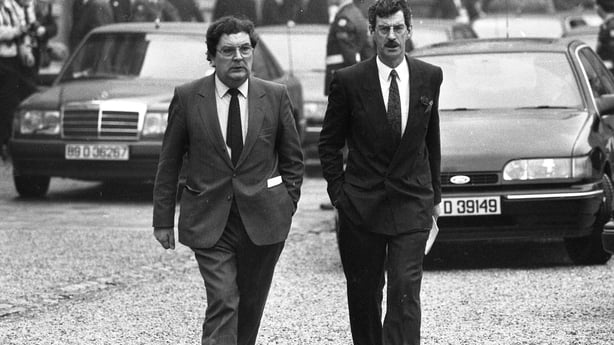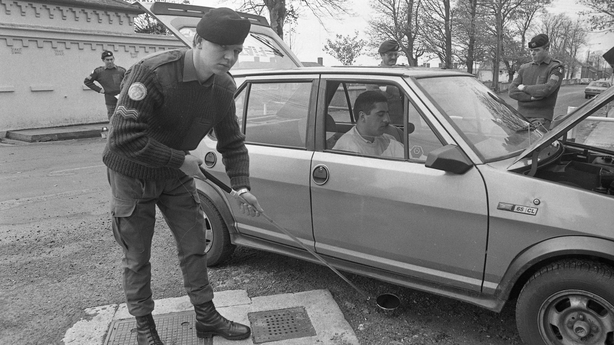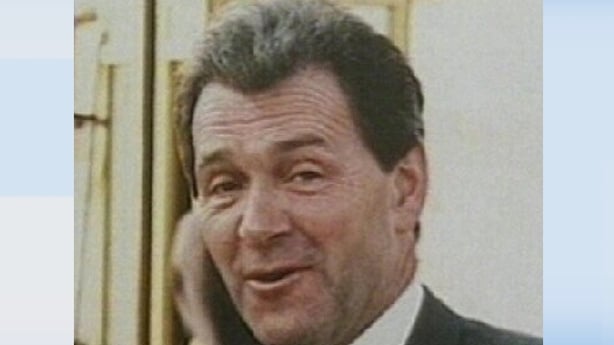By David McCullagh, Justin McCarthy and Fiachra Ó Cionnaith
The Government intervened with the Garda Commissioner after Sinn Féin leader Gerry Adams demanded that the harassment of republicans by Gardai "had to be stopped" during the first IRA ceasefire.
Mr Adams claimed he was under "very considerable personal pressure because of the harassment of republican people by the Garda and the Special Branch" at a critical period for the Peace Process according to secret government files released for the first time by the National Archives.
Officials were told by Sinn Féin's Pat Doherty that the problem had "reached crisis levels" by February 1995, and that Gerry Adams had asked that the message be conveyed that he was now under "enormous personal pressure" because of the level of harassment throughout all areas.
The Sinn Féin leader was blunter during a phone call with Taoiseach John Bruton, who in a handwritten record of the conversation wrote: 'Gerry Adams told me... "It has to be stopped".
The Taoiseach informed Adams that the civil servant who headed up the Department of Justice, Tim Dalton, had arranged a special meeting with the Garda Commissioner to discuss the instances of harassment raised by Sinn Féin. A report of the meeting with the Commissioner was to be provided to Mr Bruton afterwards.
Sinn Féin raised the issue of harassment on multiple occasions during meetings with the Irish Government in 1995.
Gerry Adams told officials that the "resentment of a few key activists" could have a disproportionate effect on the political climate for him.

At a meeting with Tánaiste Dick Spring, he claimed that "Sinn Féin were being subjected to increased levels of harassment by the Special Branch in the South" and listed several instances including the presence of "a large Special Branch contingent" at the funeral of solicitor Paddy McGrory the previous month.
He said Pat Doherty and others had been followed afterwards, and that the Sinn Féin delegation were tailed while making their way from party Headquarters.
He complained that a "conspicuous member of the ‘heavy gang’ was on duty in Dublin Castle" observing members of Sinn Féin. The ‘heavy gang’ was the name given to a group of garda members who were said to have used threats and force in their dealings with suspects, particularly during the Troubles.
At a separate meeting Sinn Féin’s Des Mackin, a former director of finance with the party, told government officials in May 1995 that local activists in Drumshanbo had been stopped and quizzed by gardaí.
He also complained that the Special Branch had kept Sinn Féin’s offices at Parnell Square in Dublin under surveillance and were questioning people exiting the building.

Mackin asked if "consideration could be given to a change in ‘policy’", adding that Sinn Féin understood the need for a police presence in crowd situations, but felt that uniformed Gardai would be more appropriate.
At a meeting with government officials Gerry Adams said occurrences of what he described as "harassment" found their way into the Republican grapevine and "gave the wrong signals."
He said: "Republican activists assumed that county-wide sweeps undertaken by the Garda were all decided at Cabinet level, and the overall climate was becoming difficult for him to handle."
Around this time Taoiseach John Bruton was concerned about the prospect of the leadership of Sinn Féin losing control of the Republican Movement and warned his British counterpart John Major there was a danger that "the movement could split, and the secessionists would be able to resume violence."
Republican complaints about alleged Garda harassment resumed after the second IRA ceasefire, with Gerry Adams complaining about an "intrusive" Special Branch presence even at the Sinn Féin meeting which led to the cessation of violence.

affected the attitude in the force to republicans
In a meeting with Foreign Affairs Minister Ray Burke and Justice Minister John O'Donoghue in September 1997, Adams claimed ongoing harassment of Sinn Féin activists was "a significant issue" and was complicating efforts to deliver on peace process commitments.
He acknowledged that Garda attitudes to republicans had been influenced by the murder the previous year of Detective Garda Jerry McCabe by IRA members in Adare.
Adams told the Ministers that "the IRA were wrong in the killing of Jerry McCabe and in other killings. He understood how the Gardaí felt but the Government needed to have a sense of how heavy is the Special Branch presence."
A similar point was made to Government officials by Pat Doherty in August of that year. He said no one underestimated the strength of feeling over the killing of Det Garda McCabe - but harassment needed to end to create a sense that the peace process was delivering.
"Mr Doherty raised an issue (as to) what Sinn Féin saw as the continuous harassment of Republicans by Gardaí," the meeting note revealed.
"He added that Sinn Féin were totally aware of the strength of feeling arising from the killing of Garda McCabe in Limerick but, even allowing for that, the level of arrests and raids - for no particular reason - in that area was excessive."
At the same meeting, Doherty’s colleague Rita O’Hare claimed that republicans who were "very peripheral" were being threatened that their files were with the Director of Public Prosecutions for possible charges.
"She also commented that the woman tasked with following her about was not very good."
